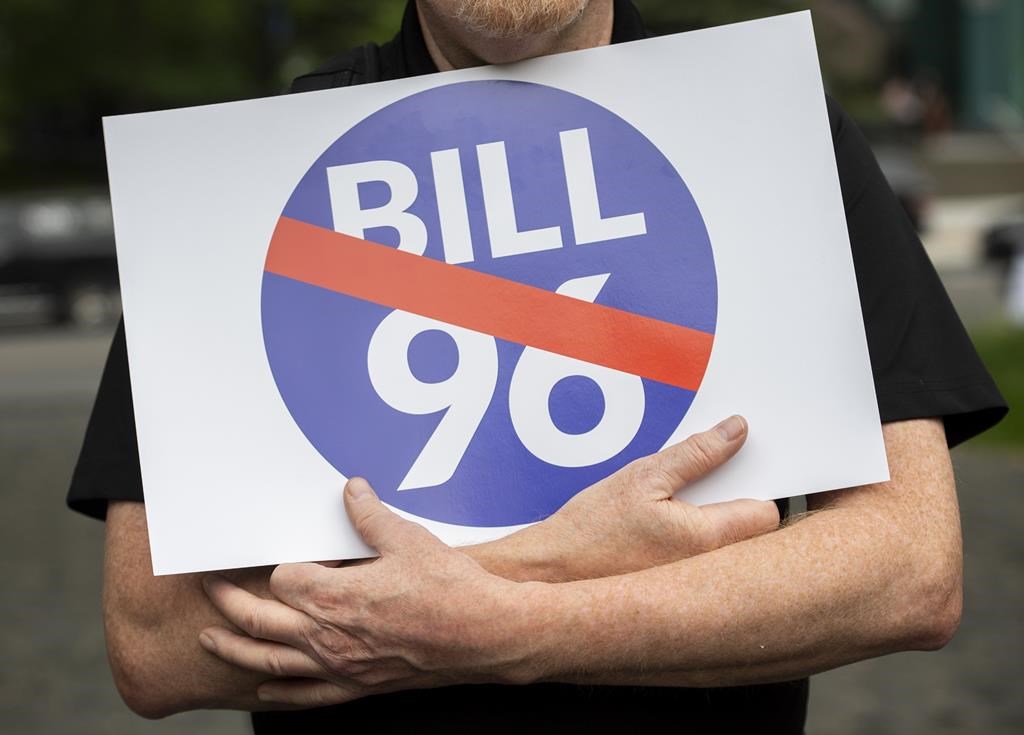A proposed regulation around the language of commercial signage in Quebec is attracting skepticism from U.S. President Joe Biden’s administration, which has “concerns” about the potential impact on American businesses.The issue came up during a wide-ranging meeting between high-level trade officials from both countries in Toronto on Wednesday.

A summary of the meeting said an advisor for the United States Trade Representative used the gathering to share “concerns abouttrademark provisions of Quebec’s Bill 96 and their potential implications for U.S. businesses, including small and medium-sized enterprises.”
Passed in 2022, Quebec’s Law 14 –better known as Bill 96– was a sweeping set of reforms to provincial language laws that the government says will further protect and advance the position of French in the province.A draft regulation published on Jan. 10 clarifies aspects of the law, including a proposed rule for retailers that dictates French must occupy a space “at least twice as large” as other languages on signage that is visible from the outside.Signs that display a trademark or company name would also have to include at least some French terms, such as “a description of the products or services concerned, or a slogan,” the draft regulation states.It proposes a June 2025 deadline for businesses to comply with the signage rules.
- South Africa celebrates 30 years since end of apartheid, but discontent grows
- Grocery code: How Ottawa has tried to get Loblaw, Walmart on board
- Alberta to overhaul municipal rules to include sweeping new powers, municipal political parties
- Military judges don’t have divided loyalties, Canada’s top court rules
The Office of the U.S. Trade Representative has not detailed its concerns and did not respond to questions from The Canadian Press on Friday.But Michel Rochette, president of the Quebec branch of the Retail Council of Canada, sees the Biden administration’s message as a“signal” couched in diplomatic language.“We have to understand that there is concern on the American side, and we have to address this fear,” he said in an interview.Eliane Ellbogen, a Montreal intellectual property lawyer with Fasken, said the rules on commercial signage have been a source of concern in the business community.“For the past year and a half, we’ve been contacted almost every day with questions, especially from small and medium-sized businesses,” she said. “We’re faced with a lot of incomprehension, honestly, and surprise, in relation to criteria that to them seem ultra-demanding.”Ellbogen said the proposed regulation could entail major expenses and administrative steps for businesses that will have to modifytheir signs or trademarks.The Quebec government asserted earlier this month that the majority of businesses in the province were already compliant withthe new commercial signage criteria.In a notice accompanying the draft regulation, Quebec estimates the total combined cost for all businesses to comply with the regulation will be between $7 million and $15 million.Some businesses have questioned that estimate, however.“What we’re told is that it could be around $50,000 to $100,000 per sign,” Ellbogen said. “For a retailer with around ten branches, it could represent a cost of a million dollars.”Fasken is exploring the possibility of challenging commercial signage provisions in court, Ellbogen said. The firm is specifically analyzing whether those aspects of Quebec law would conflict with federal trademark law, and whether federal law would prevail in this case.Retailers consider the June 2025 deadline “very tight,” Rochette said.“Two years ago, (officials) were saying they’d have three years to adapt, which isn’t quite true,” he said. “The countdown has already begun, but we don’t yet know the rules of the game.”In the meantime, merchants can’t take any costly preparatory steps until they have confirmation that the regulation will be adopted as proposed. It’s undergoing consultations until the end of February.“Merchants have to wait for the final draft to be sure they’re… respecting the rules,” Rochette said.In a written statement, the provincial minister of the French language, Jean-Francois Roberge, stressed that French “will always be vulnerable in Quebec” and that government intervention was necessary.He said the province’s language watchdog, the Office quebecois de la langue francaise, will “offer quality support to companies thathave questions about Quebec language laws.”“Our government is constantly proving that in Quebec, we can defend French and offer a welcoming environment for businesses,” hesaid.

Comments